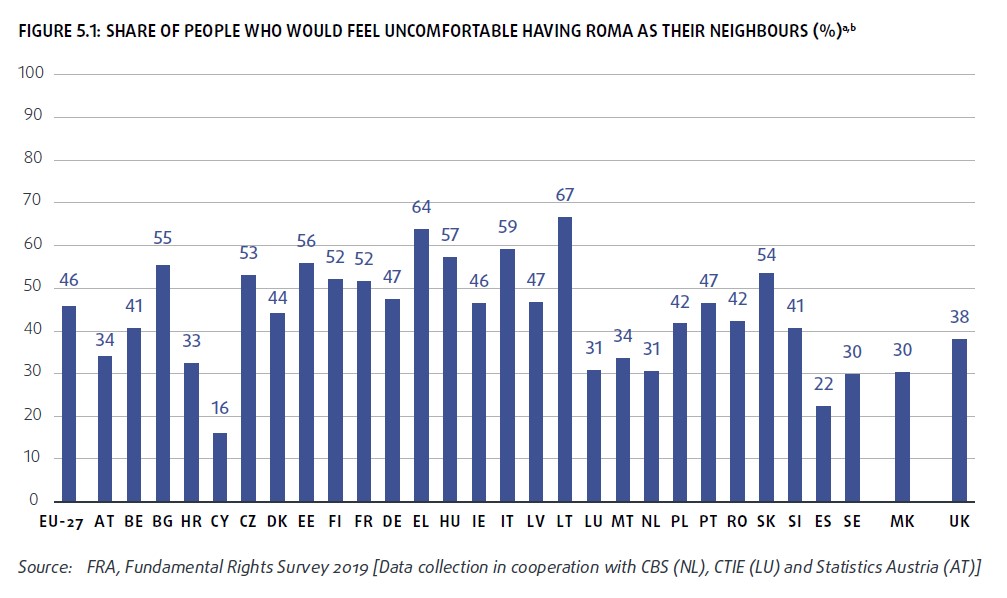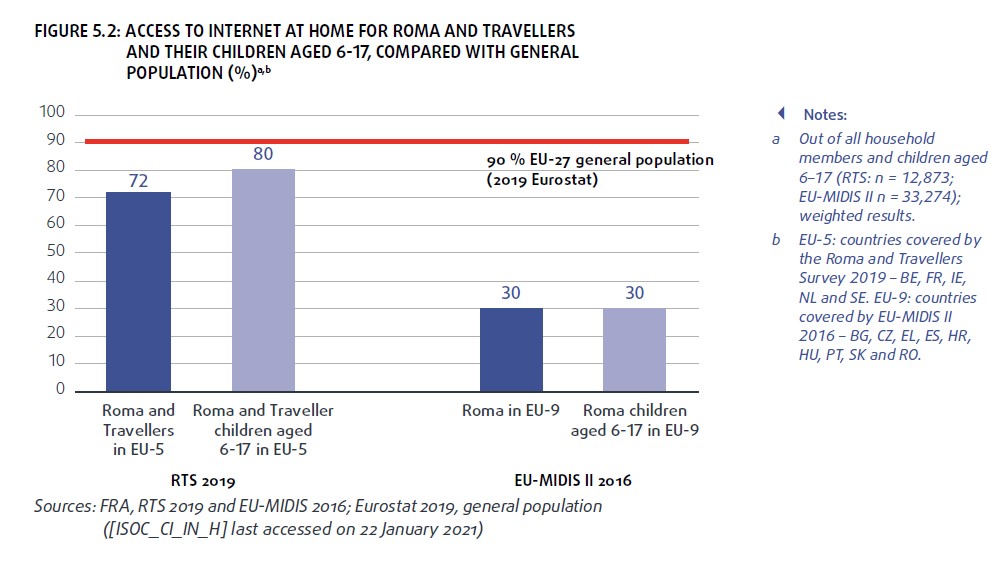The EU Agency for Fundamental Rights (FRA) has published its annual report on Fundamental Rights 2021, which covers all aspects related to fundamental rights in Europe during 2020.
The report covers the 27 EU Member States as well as the Republic of North Macedonia and the Republic of Serbia.
The main chapter of this report focuses on the impact of the Covid19 pandemic on fundamental rights (in terms of health, education, employment, justice, etc.). This chapter refers to specific groups, including the Roma population, and how they have been affected by the social and health crisis. In particular, it shows the previous vulnerability situation of many Roma who have not only experienced a higher risk of contagion but have also been more affected by the confinement measures. These measures, for example, have left many Roma families unemployed and without other means of subsistence. Moreover, during the pandemic, Roma have been subjected to discrimination, antigypsyism attitudes and violations of their fundamental rights.
Some references to measures regarding Roma population can be found in the chapters on equality, discrimination and racism, or in the chapter on rights of the child, but the bulk of the information on the fundamental rights of Roma in Europe during 2020 is found in Chapter 5 of the report, which reviews the main developments carried out in the Member States during the last strategic framework, which ended in 2020. At a general level it is concluded that, despite the differences between Member States, progress in Roma inclusion over the last 10 years has been limited. Although the framework contributed to the development of the instruments and structures aiming to promote Roma inclusion, the objective of “putting an end to the exclusion of Roma” has not been achieved. Only little progress has been made in education and poverty reduction, but there is no progress (or even deterioration) in employment, housing and health.
In this chapter, the report devotes specific sections to the fight against antigypsyism and discrimination, education, housing and health.
On the issue of antigypsyism, the report shows its concerns on the persistence of this form of racism, citing results from the FRA’s 2019 survey which, for example, showed that almost half of the population across the EU-27 indicated that they would feel uncomfortable having Roma as neighbours.

In several studies carried out in Europe high levels of intolerance towards the Roma population are still found. There are also numerous cases of discrimination and harassment by the authorities, leading to mistrust on the part of Roma towards the police and the judicial system. The report particularly emphasises how during the Covid19 pandemic the Roma population has been scapegoated on many occasions, especially during the first wave.
Regarding the education, the report highlights the worrying situation of educational segregation of the Roma children, advocating the need for further measures to promote educational inclusion and highlighting the clear risk posed by the digital gap for Roma children.

The role of Roma education mediators and assistants to facilitate communication between schools and families is highlighted.
The poor housing conditions of many Roma remain to be a cause for concern. This situation has been worsened by lockdowns during the pandemic, evictions and the limited support available.
The measures taken to improve the health conditions of Roma people focused on emergency responses, in most cases not providing long-term solutions. Adverse living conditions and limitations in accessing health services are a serious problem, that can lead, according to the FRA’s survey from 2019, to a 10 fewer years in the life expectancy of Roma compared to the general population.
As a positive aspect, the mobilisation of health mediators, helping with the distribution of medicines, quarantine of people, evaluation and monitoring of hygiene and social distancing measures, and even psychological support for families, is mentioned.
The report contains a specific section dealing with the new Strategic Framework for Equality, Inclusion and Participation of the Roma population, which reviews some of the lessons incorporated into this new strategy (inclusion of the fight against antigypsyism, consultation and cooperation with Roma civil society, the promotion of active Roma participation or the strengthening of the National Roma Contact Points, among others). This analysis places particular emphasis on the establishment of quantifiable indicators linked to the objectives set, as well as the recommendation to strengthen data collection and monitoring of the strategies. “The persisting lack of disaggregated data on people with Roma backgrounds poses a challenge to the monitoring progress”, making it difficult to identify the effects of the investments.
Lastly, a series of FRA opinions on these issues and the role of Member States in designing the national strategies following the EU Roma Strategic Framework for equality, inclusion and participation for 2020-2030 can be found:
- The fight against discrimination and antigypsyism should be mainstreamed in all policy areas of the national Roma strategies, and should include targeted measures. Such measures should be designed and implemented together with Roma communities’ representatives, to promote positive narratives about Roma and Travellers, raising awareness of their history of discrimination, segregation and persecution.
- Coordinated measures to ensure that all children have access to distance learning tools should be implemented. Any measures in education should include targeted actions tailored to specific needs of the diverse Roma and Traveller groups. The recruitment, training and deployment of more Roma mediators and teachers with a Roma background should be encouraged. Targeted measures are sustainable and well-funded, making use of EU funds
- Priority should be given to the implementation of the new EU Roma strategic framework. The national plans should be ambitious and include effective monitoring systems to assess progress, measuring the impact of both mainstream and targeted measures, as well as the effective use of national and EU funds. National Roma strategies should include specific reference to the meaningful participation of Roma and Travellers.
In relation to the use of funds, the report emphasises the need to make an effective use of the available EU and national funds by investing in targeted measures for the Roma population.
Further information:

